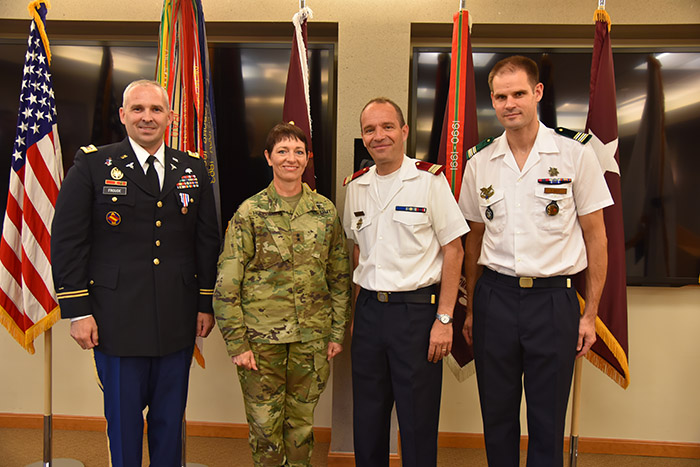French Defense Ministry Honors WRAIR Scientist

The government of France has come to Fort Detrick to honor a colleague for his groundbreaking work in international biotechnology.
Maj. Jeffrey Froude, a clinical pharmacologist at the Walter Reed Army Institute of Research, received the bronze Military Health Service Honor Medal. French Ministry of Defense representative Jean-Yves Le Drian presented the medal during a ceremony at the U.S. Army Medical Research and Materiel Command's headquarters at Fort Detrick on Aug. 5.
The award honors Froude for his research since 2010 as part of an engineer scientist exchange between the DOD and the French Defense Ministry Antibodies Biotechnology Unit.
Beginning in 2010, Froude and his team set out to develop therapeutic antibodies to treat Ebola and Marburg viruses. The work required the creation of an antibody fragment library for each virus from which researchers could work to develop virus neutralizing treatments. In the course of his work, the team developed patented products that have already generated more than $3.1 million in revenue.
"I feel really good. It's an extension of a collaboration," said Froude. "It's a representation of what we can do together … not only developing an understanding of how another government works, but we're also able to work and develop products together. It's a great honor to be awarded this French medal. I'm taken aback."
Froude, who was previously with the U.S. Army Medical Research Institute of Infectious Diseases, also led collaboration with the French on projects including anthrax medical countermeasures. He published two international reviews as first author, and another as co-author. And if that wasn't enough, Froud took a leadership role in training doctorate and master's degree students, and helped young researchers with the Microbiology Department of the French Army Biomedical Research Institute in writing and publishing articles in international journals.
At the award ceremony, the French government expressed deep appreciation of what they described as his "availability and scientific rigor."
"This original work," he said, "was completed in France in 2013, and it's already begun its transition cycle. It's now in its third year of … translational research where you're translating a product from the bench to the bedside. "
Froude and his colleagues at WRAIR are in the third year of grant-funded work to refine what they've already accomplished and apply what they've learned to cultivate products that both countries can use, as well as proprietary anti-viral tools to protect U.S. Warfighters.
The effort and goal, he said, is to give the Army the latest and best technology, practices, processes and medical approaches to save U.S. military lives that might previously have been at risk.
 An official website of the United States government
An official website of the United States government
 ) or https:// means you've safely connected to the .mil website. Share sensitive information only on official, secure websites.
) or https:// means you've safely connected to the .mil website. Share sensitive information only on official, secure websites.


